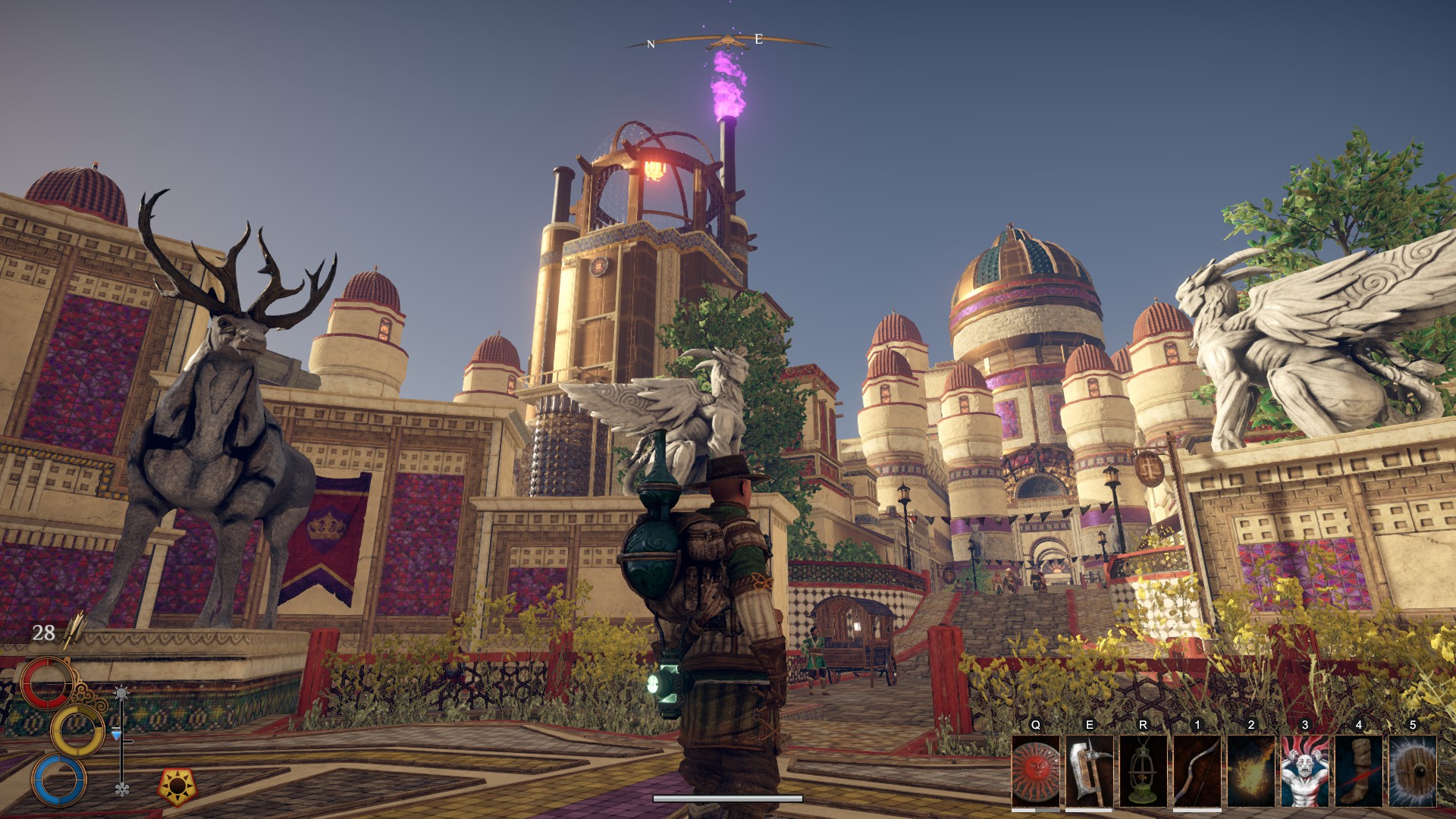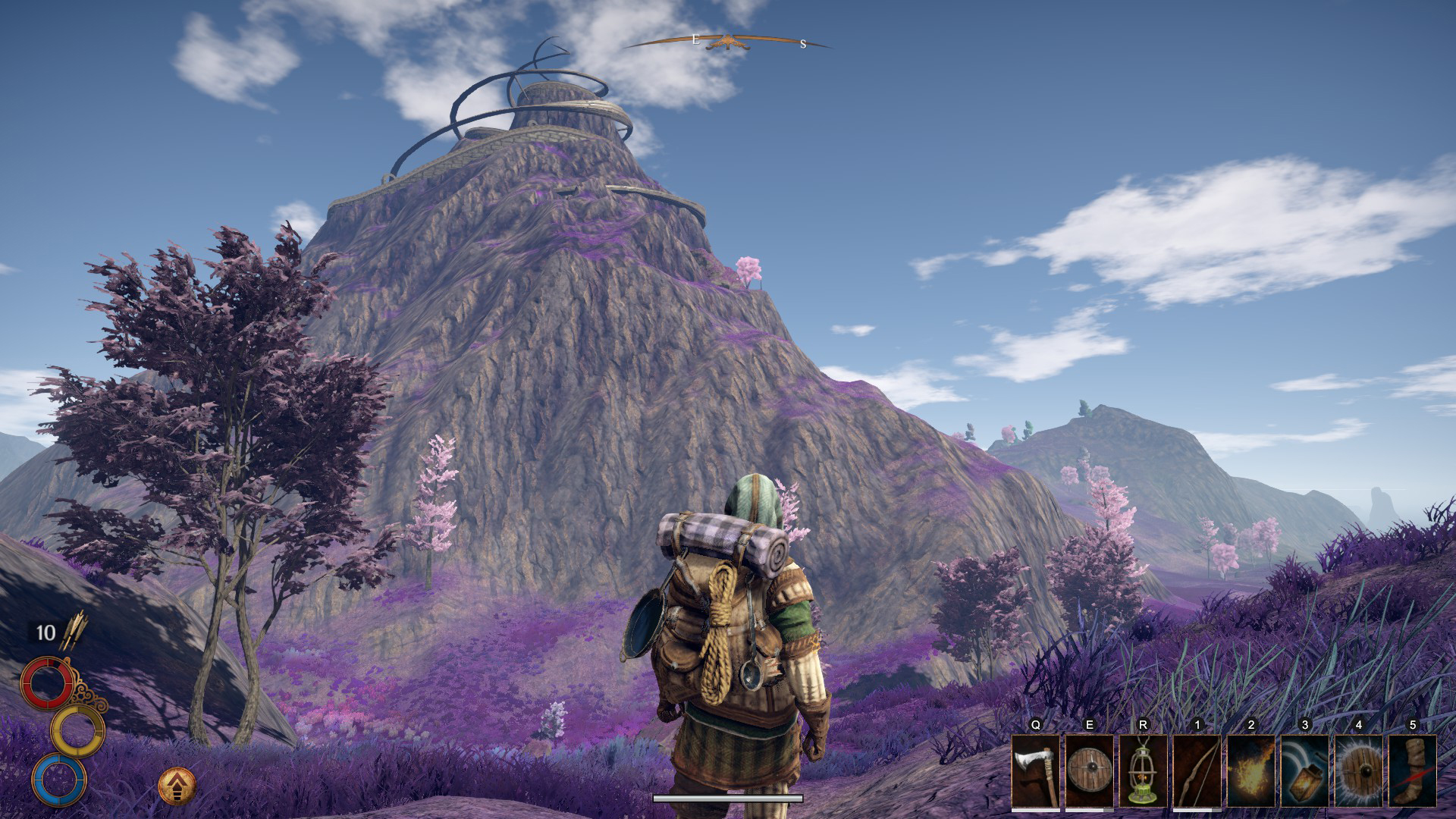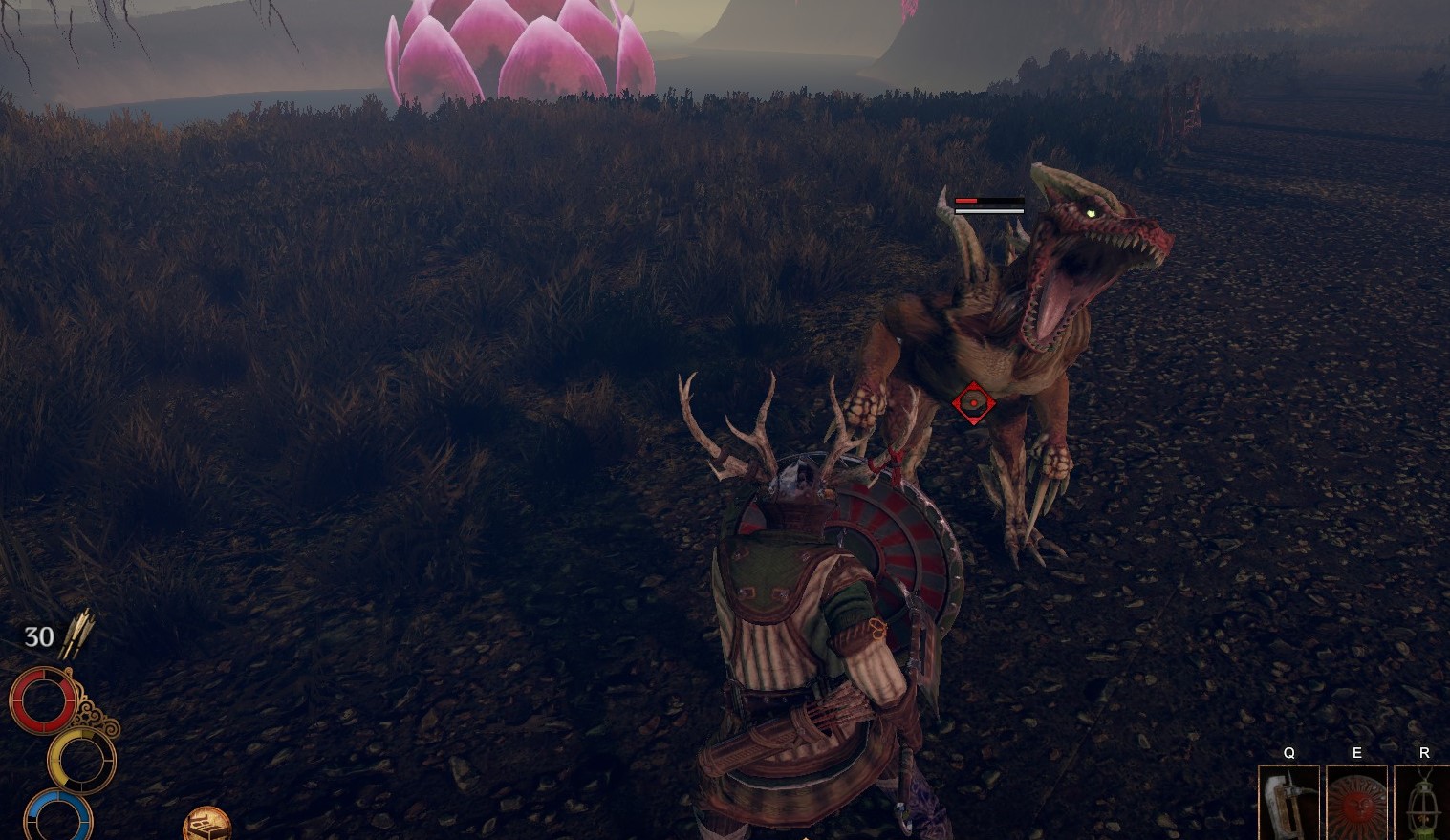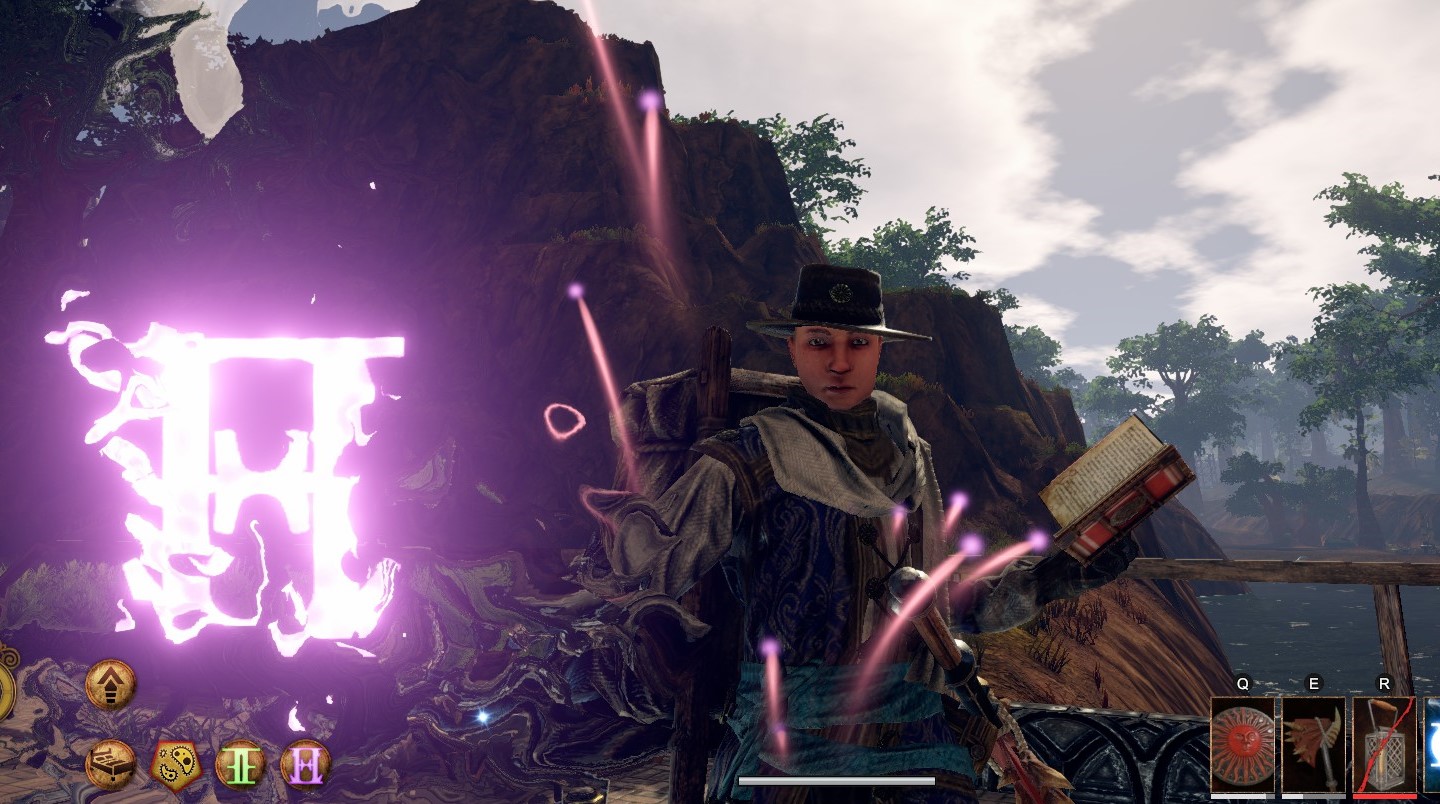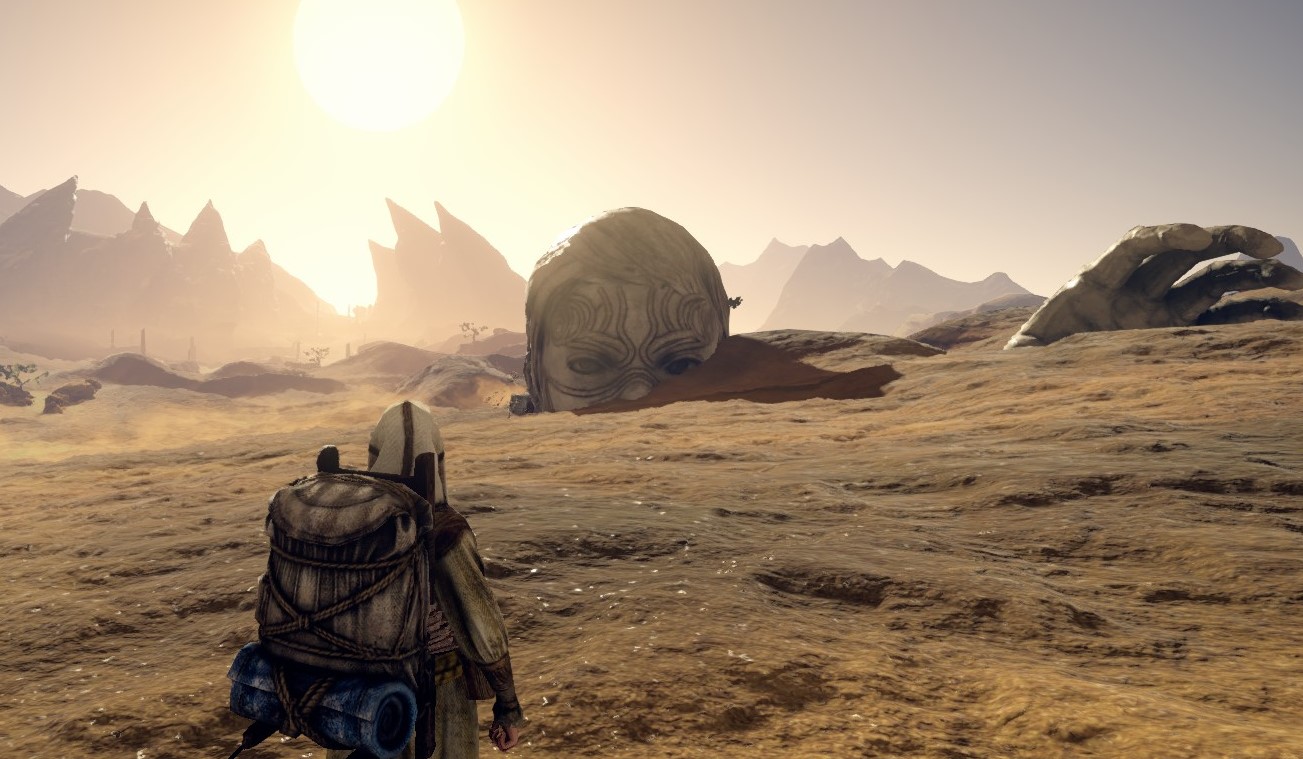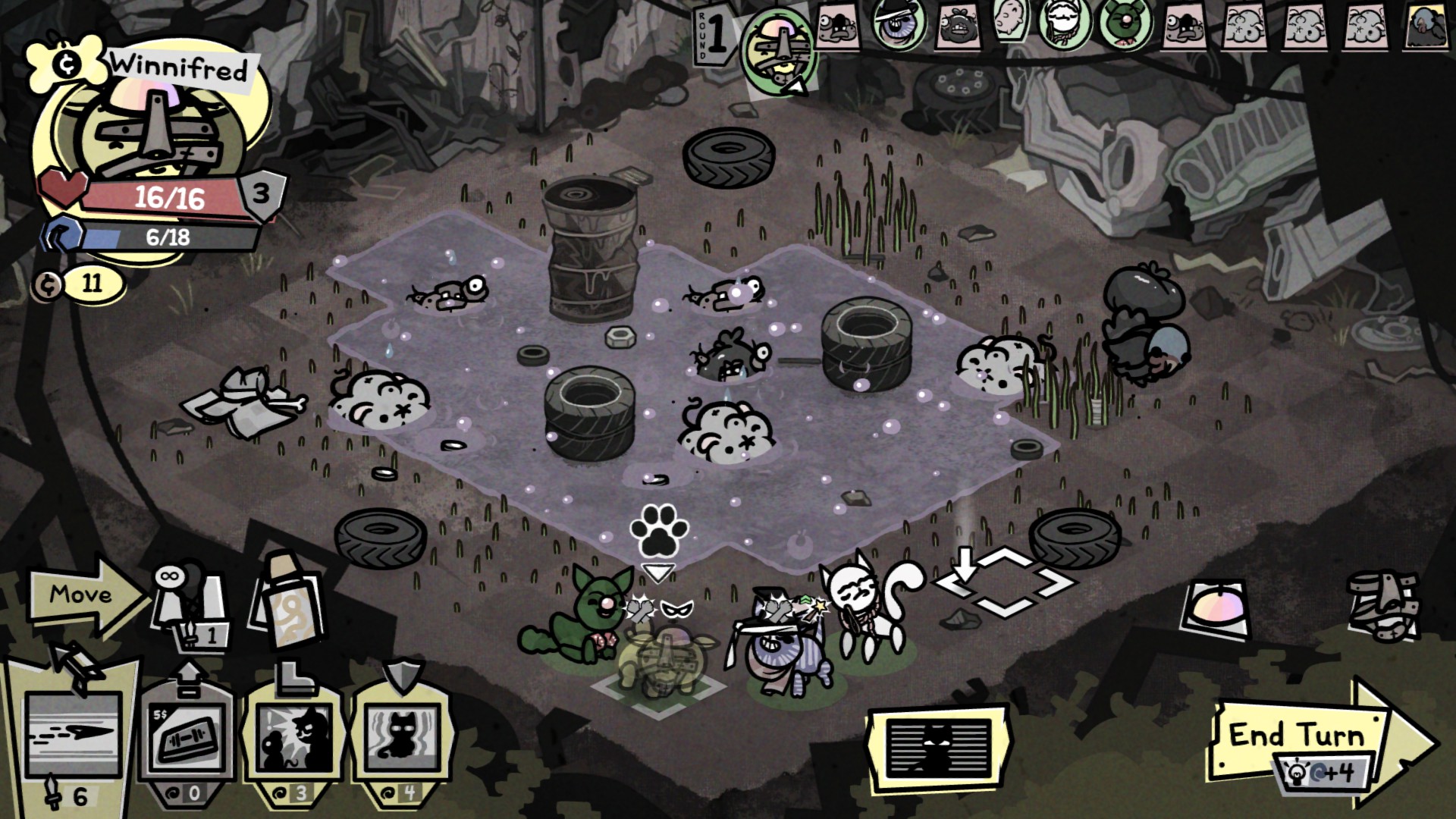Our Verdict
A few rough edges don't stop Outward from being a gem of an RPG.
PC Gamer's got your back
What is it? A fantasy RPG with survival elements
Expect to pay $40/£35
Developer Nine Dots Studio
Publisher Deep Silver
Reviewed on GTX 980, Intel i5-6600K, 8 GB RAM
Multiplayer Online and local co-op
Link Official Site
A game where you can never die sounds like it'd make you fearless. Why worry about failure when instead of dying in a battle you simply fall unconscious and wake up somewhere else?
It turns out the opposite is true in fantasy RPG Outward. Failure costs you something more precious than a videogame life: It costs you time. Time to heal, to rest, to repair your gear and restock your supplies, to fill your belly with food and cure your ailments with potions, to travel all the way back to the site of your defeat to try again—and possibly to fail again. Immortality is far more terrifying than death.
You can't just reload your last save when you lose a fight, because Outward constantly auto-saves your progress. Every lengthy trip across the map (there's no fast-travel or mounts), every purchase at a vendor or skill upgrade at a trainer, every decision in a questline, and every single fight, is an event that needs to be very carefully considered and prepared for. The auto-save and never-die principles of Outward are harsh, and feel punishing at times, but beyond making your failures meaningful they also make triumphs, even tiny ones, monumental.
Combine this with enjoyable survival elements and a brilliant magic system, and Outward becomes a rare gem. It's got plenty of rough edges, but it's an RPG where traditionally mundane tasks become complicated, where normally simple decisions become weighty, and where it feels like every single choice you make really matters. I love this game.
Rocky road
I also, sometimes, hate this game. Honestly, most of my stories in Outward are of failure. The time I spied a bandit in the distance and laid out several tripwire traps only to discover it was a bandit wizard who then knocked me unconscious from range with ice magic, never even getting near all my traps. The time I took off my bulky backpack to allow myself greater mobility in a fight only to realize I'd left my magic book inside it, and thus couldn't cast any of the rune spells I'd just learned. The time I walked into a castle and chatted with a chieftain who was perfectly friendly until he stripped me of my belongings and threw me into his dungeon.
I even failed my very first quest. It seemed simple: Earn 150 silver coins to buy back my house (a lighthouse, in fact), which had been repossessed by my town's leaders to repay a debt I owed. I set out to recover an unusual mushroom from a cave, hoping it'd fetch a nice price from a collector, but along the way I lost a fight to two bandits, who dragged my body back to their fort. I managed to find my gear, escape, and heal myself, but I stepped into a spike trap and lost consciousness again. This time I was dragged to safety by a mysterious benefactor, but I woke up on the far side of the map. By the time I made it back home—which took me through a fort filled with angry ghosts I was in no way prepared to handle—it was days later, and the time-sensitive quest to buy my house had expired. Now I owed 300 silver. It was nearly a week later before I even had a proper bed to sleep in.
In any other RPG I probably would have just reloaded my last save and avoided most of those headaches. Maybe I'd have fought those bandits again and won after a few tries. Maybe I'd have avoided that spike trap and made it home on time. I definitely would have skipped that damn hellish ghost fort. But while I didn't enjoy everything about the difficult trip back home, it's now a part of my character's long and troubled history of devastating failures and eventual successes, and each time I return to my lighthouse I remember everything I went through to acquire it.
Keep up to date with the most important stories and the best deals, as picked by the PC Gamer team.
Plus, I gained a long-lasting bitter grudge against those bandits, and dozens of hours later, even after having a peaceful and productive meeting with them as part of the main quest, I went back to their fort and killed every last one of them. Revenge is a dish best served without quickloading.
There are downsides to Outward's systems, too. One quest sent me searching for a hideout (bandits again) and owing to Outward having no quest arrows and not displaying your own location on the map, it took quite a lot of running around and searching based only on the vague directions I was given. While exploring an area on some cliffs, I slid down an incline and got stuck between the cliff and a rock wall. I couldn't wiggle free and remained trapped in the sliding animation. Since you can't fast travel or reload a save, there I stayed, for two real hours, hoping I'd eventually slip into unconsciousness from lack of food or drink or sleep.
It never happened: my meters all ran down to zero, but they never lowered my health, only resulting in debuffs for my stamina. Even contracting a disease from exposure (I took off my clothing when it began to rain) didn't knock me out. I eventually had to go into the game files and delete my last several autosaves, which put me back at the start of my journey to find the hideout. I don't mind losing time from a defeat in Outward, but losing real world hours from getting stuck on some world geometry was deeply frustrating.
Spellbound
Spells aren't all-powerful, but it still feels like you're doing something powerful when you master them.
Magic in Outward involves more complexity than just keeping a mana meter filled. The fireball spell, a staple of fantasy games, is essentially like throwing a lit match at someone. It's weak unless it's cast while standing in a magic circle, which is another spell that requires physical components that need to be collected and sometimes even crafted.
Once the circle is cast, the fireball becomes explosive and deadly, and the preparation required to unleash it at its fullest turns it from just a reflexive keypress into a satisfying sequence.
Spells and skills can also be used in conjunction with one another: I can cast a Warm Boon spell that allows me to cast a second spell which infuses my weapon with flames for extra damage, and then use a Gong Strike ability to bash my burning weapon against my metal shield, letting loose a shockwave of flames. Learning these skills and combos and putting them to use makes the magic feel, well, almost like science. Like something that has real rules and procedures. Spells aren't all-powerful, but it still feels like you're doing something powerful when you master them.
Like everything else in Outward, magic has a cost. Gaining the ability to cast your first wimpy fireball requires first fighting (and probably failing) your way to the center of a mountain, and then permanently sacrificing a portion of your physical health and stamina in an arcane ritual. The more powerful you want your magic to be, the weaker you'll be physically.
There's not a massive open world in Outward, but winding dungeons, hidden caves, and the relatively slow pace of travel across the four regions makes it feel bigger than it is, especially when you're just starting out. While cities are full of NPCs, there are typically only a few to talk to, pretty much just the quest-givers and merchants (who often have their own simple side-quests). The voice acting is so-so (I muted it because I'd rather read conversations as text) and the writing is generally good if fairly standard fantasy fare with the occasional jarring anachronism, such as when a king complained that one of the factions "took their sweet-ass time" preparing for a peace negotiation.
I'm ready to make a new character and play another 50 hours.
There aren't a huge number of different enemy types in the world, and once killed they'll remain dead for days, so retracing your steps across the four regions of Outward can occasionally be completely uneventful (though it can sometimes be a relief to make it from one area to the next without having to fight anything). The main quest I finished for one of the three factions wasn't terribly long in and of itself, though combined with side-quests and frequent setbacks and my hesitant exploration of the world, it took me roughly 50 hours to complete.
And I'm ready to make a new character and play another 50 hours. Unlike games such as Oblivion or Skyrim, where a single character can climb to the top of every guild or completely unlock every skill tree to become a living god, you'll need multiple characters in Outward to explore every possibility available. You're restricted from advancing completely through every skill tree (there are eight in total, and you can unlock the upper tiers of only three with the same character). This is yet another instance of your choices being weighty ones—I spent hours making multiple visits to several skill trainers, hemming and hawing, before finally deciding on which skill trees to follow—and it also opens the door to future playthroughs where you'll experience the world in a different way with a different set of skills and abilities.
You don't need to brave the harsh world of Outward alone—co-op play is available, either online or locally with split-screen, and adventuring with a friend is supremely fun (not to mention, extremely rare for a singleplayer fantasy RPG). There's a big flaw in co-op, in that only the person hosting the game will gain quest progress, but I still had a great time playing a few hours with Wes as we explored, fought, fled, divided up loot, camped out under the stars, and occasionally ran into our own failures. (You can, at least, revive a fallen companion.)
Outward's unusual design provides a different experience than I've found in most RPGs. It completely breaks the common habits of fast-traveling, gaining a fortune in loot, becoming an all-powerful god, and reloading saved games when things don't go as planned or you make a choice you regret. It makes minor setbacks feel like major obstacles to overcome and it makes small victories feel like utter triumphs. Outward is harsh and occasionally frustrating, but it does what so few games do. It requires you to put real thought into the choices you make, and it makes those choices feel like they really matter. Most of all, it makes you approach each and every encounter as if your life depended on it—even though you never die.
A few rough edges don't stop Outward from being a gem of an RPG.

Chris started playing PC games in the 1980s, started writing about them in the early 2000s, and (finally) started getting paid to write about them in the late 2000s. Following a few years as a regular freelancer, PC Gamer hired him in 2014, probably so he'd stop emailing them asking for more work. Chris has a love-hate relationship with survival games and an unhealthy fascination with the inner lives of NPCs. He's also a fan of offbeat simulation games, mods, and ignoring storylines in RPGs so he can make up his own.
